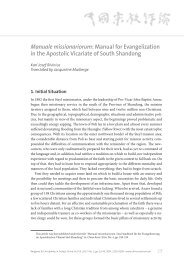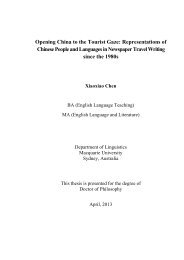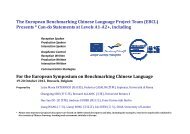EDUCATION IN CHINA
Education-in-China-a-snapshot
Education-in-China-a-snapshot
Create successful ePaper yourself
Turn your PDF publications into a flip-book with our unique Google optimized e-Paper software.
Chapter 2 – Educational reforms and current issues<br />
Strengthening educational inspection<br />
National educational inspectorate institutions are<br />
charged with inspecting policies, inspecting education<br />
and assessing quality. In recent years, the government<br />
has increased the work forces of inspection institutions<br />
in order to achieve these objectives.<br />
According to official documents published in 2013, at<br />
least one inspector should be assigned to each primary<br />
or secondary school in China. In addition, the inspector’s<br />
name, picture, contact information and major tasks<br />
should be released to the public. Inspectors are recruited<br />
by local government inspection institutions. These<br />
institutions chose inspectors for the most part from a<br />
pool of experienced headmasters, teachers, educational<br />
researchers and administrators. Each inspector is<br />
assigned to about five schools, and performs regular<br />
inspections of each school at least once a month. The<br />
inspection covers enrolment, school fees, curriculum,<br />
teaching, learning burden, food sanitation and so on.<br />
Inspectors report back to inspection institutions after<br />
every inspection. They also communicate comments<br />
and guidance to schools after inspections. Inspectors are<br />
rotated every three years. In May 2015, the inspection<br />
system covered over 99% of primary and secondary<br />
schools.<br />
The government recently established a special inspection<br />
system for major educational emergencies. According<br />
to the Interim Measures for the Special Inspection of<br />
Educational Major Emergencies published in 2014, once<br />
an emergency such as a natural disaster or accident<br />
happens, the inspection institution becomes involved<br />
in order to make sure that schools respond actively. The<br />
inspection institution makes sure that schools handle the<br />
emergency properly and protect educational activities.<br />
Throughout the process of solving the problems, the<br />
inspection institution should guarantee promptness,<br />
transparency and clear responsibilities of all parties<br />
concerned.<br />
<strong>IN</strong>SPECTION LEGISLATION<br />
The Regulation on Educational Inspection was issued by<br />
State Council in 2012, after which the Tianjin municipality<br />
developed its own regulations with more details and<br />
practical rules. The regulation of Tianjin municipality<br />
has been approved by the Standing Committee of<br />
People’s Congress of Tianjin Municipality, and was made<br />
a law in May 2014. In 2015, Shanghai also approved its<br />
own regulation of educational inspections. It is widely<br />
recognised as a breakthrough that has made the system<br />
more powerful.<br />
Inspection legislation guarantees the implementation of<br />
the educational inspection system, which is important to<br />
the reform of the educational management system.<br />
BUILD<strong>IN</strong>G AN AUTHORITATIVE<br />
AND SPECIALISED <strong>IN</strong>SPECTION TEAM<br />
The Regulation on Educational Inspection established<br />
specific standards for inspection teams, as well as the<br />
composition of these teams. Previously, inspection teams<br />
consisted almost entirely of retired educators. Recently,<br />
more and more provinces have recruited currently active<br />
teachers and educational administrators who know<br />
more about modern education compared to their retired<br />
colleagues. Additional training of inspectors is carried out<br />
regularly to ensure their proficiency.<br />
Some regions, like Chongqing municipality, have<br />
started to create specialised inspection teams, and to<br />
mandate that teaching and administration be evaluated<br />
separately. Recently, teaching inspectors have been<br />
given professional titles via the educational researcher<br />
professional title system. This has made it possible for<br />
inspectors to receive promotions. Anhui province made<br />
a similar adjustment and recruited four chief inspectors<br />
to undertake separately the inspection of elementary<br />
education, vocational education, higher education and<br />
lower-level government.<br />
STANDARDISED PROCEDURES<br />
AND OPERATION NORMS<br />
More and more provinces have developed standardised<br />
procedures for inspection and quality assessment. Hunan<br />
province carried out the Whole Process Supervision<br />
standard, mandating inspection before, during and after<br />
the implementation of one specific policy. Inspection<br />
before implementation refers to normal inspection<br />
designed to identify potential problems or defects.<br />
After this inspection, the feedback provided informs<br />
administration decisions, which may lead to some<br />
adjustments. Inspection during implementation requires<br />
inspectors to visit each school at least twice a week, to<br />
guide their adjustments. Inspection after implementation<br />
entails assessing the effectiveness of adjustments,<br />
during which implementation process is summarised.<br />
If new problems are found, new adjustment will be<br />
required. Within each inspection, inspectors introduce<br />
operation norms to make the process systematic<br />
and comprehensive. This Whole Process Supervision<br />
standard as well as the operation norms help improve the<br />
effectiveness of the inspections.<br />
<strong>EDUCATION</strong> <strong>IN</strong> CH<strong>IN</strong>A: A SNAPSHOT © OECD 2016 – 33





